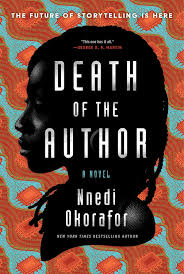Death of the Author, by Nnedi Okorafor
A novel-within-a-novel featuring robots who crave stories springboards Zelu, the protagonist of Nnedi Okorafor’s latest book, Death of the Author, into her own far-flung adventures in this fast-paced blend of science fiction and family drama.
I started listening to the audiobook of Nnedi Okorafor’s Death of the Author on the day it came out, about three weeks ago. Then I found out about the limited special edition. After finishing the audiobook, it was hard to resist buying that special edition, because I love the way it looks. Alas, buying a physical book right now goes against a self-imposed ban I started on January 1. Why would I implement such a ban? Well…I’m trying to make a concerted effort to get to books on my TBR, especially all those on my floor.
If you haven’t imposed such ridiculous limits on yourself, and are looking for something fresh and unusual, I highly recommend Okorafor’s latest. My first five-star read of the year! This is saying a lot since I’ve already DNF’d at least three books since my last blog post. While familiar with Okorafor, I’ve only read Binti up to this point. I liked it, but can’t remember much in the way of specifics (the fault of my memory, not the writing).

“Our Ancestors Were Probably So Ashamed”
Death of the Author opens with one of several interviews of people close to Zelu, in this case one of her many sisters, Chinyere. Why the interviews? It isn’t clear, but there’s a sense that it’s after something big has happened to Zelu. Exactly what is ultimately left up to us as readers. We get a glimpse of what Zelu has been up against as Chinyere, recounting an episode about her sister, proclaims that “Our ancestors were probably so ashamed this night.” With guilt coming from as far back as your ancestors, how does anyone have a fair shot, especially when the “transgression” Chinyere refers to doesn’t seem like much of a big deal?
Slogging Away
We switch rapidly to the island of Tobago, at the wedding of another of Zelu’s sisters. The family, with Yoruba and Igbo roots in Nigeria, all live in Chicago now. Zelu’s parents are retired, but her numerous siblings are all either doctors or lawyers. I think there’s an engineer in there, too. Zelu, no slouch, has an MFA in creative writing, but she’s been slogging away as an adjunct professor, teaching students whose writing she can’t stand. The fact that her own novel keeps getting rejected, after ten years of working on it, adds to her frustration.
The current semester has tried her patience and just before leaving for the wedding, she goes off on one of the grad students who keeps pushing her for comments on the pages he’s submitted, pages which Zelu thinks are “Just gibberish. Like a robot attempting to be creative and getting the very concept of what that means all wrong.” To her credit, she does hold back, at first, but then, at his insistence, she scorches his pages.
Still Blames Herself
Zelu, an expert swimmer, enjoys the sun and sand in Tobago, even as she puts up with insensitive comments from relatives about being “crippled.” A wheelchair user for twenty years after an accident at twelve, she still blames herself for the accident. When her boss calls to fire her, she goes into shock. What a slap in the face everything is!
Things Crack Open
Depression sets in, and back in Chicago Zelu ignores her family’s pleas to look for a job and do something with her life. Then, things crack open and she has a massive breakthrough in the form of a story (presented in Death of the Author as the novel-in-a-novel) whose idea comes to her all at once. She writes about “rusted robots” in a world devoid of humans but populated by human-like robots, “Humes,” who have “a profound love of storytelling.” As these robots meet each other in the dystopian lands of the former Nigeria, they exchange their collected stories because “Stories were our food, nourishment, enrichment. To consume a story was to add to our code, deepen our minds.”
Living the Dream
As this story unfolds, so too does Zelu’s. She finds herself living the dream, with a three-book deal, a movie deal, and millions of dollars in advances. She marvels at what’s taking place, meanwhile her family still isn’t on board. Navigating interactions with fans on social media is complex. An intentional post of a lame platitude, just to gauge reaction, is met with head-scratching admiration. Little by little she falls for the admiration, using it as a substitute for the lack of family support. “Finally, this was what it felt like to be seen. All her life she’d tried to make herself known. Now she’d spoken, and so many had listened.”
A Sense of Hope and Optimism
Zelu’s story, the interviews and the novel-in-a-novel intertwine and the issues of social media and technology, among others, beat an ever-louder drum. The book hits all the emotional highs and lows, and has some really funny moments. Liz Femi, Anthony Oseyemi, Jason Culp, and Chris Djuma expertly narrate the audiobook.
I love Zelu’s sense of hope and optimism, and her courage to stick up for herself and her independence. The story makes us question how much we owe to those around us. Is doing what we want necessarily selfish? Or is doing what we want the only right thing to do for ourselves, regardless of others’ opinions? To what extent do we owe others in our orbit and what they think consideration? The tethers of trauma and familial pressure are enormously relatable, even for those with no such issues.
Nigerian Food and Talking Heads
Okorafor’s descriptive writing never drags, and the pace remains steady throughout. I particularly enjoyed reading about Nigerian food. Death of the Author has inspired me to find some of the ingredients so I can try a few recipes. I’m thinking maybe fried plantains and jollof rice. Not sure I can find everything I need, although there is quite a large Nigerian population here in Torino, so who knows? Another high point are the references to what no doubt were influences on Okorafor. Zelu uses passwords like “Conan” and “Groke,” and one chapter title (that I recognize) is a nod to Douglas Adams. There is also at least one reference to a Talking Heads song. I love that!
Not a Hard Sci-Fi Fan
I personally have no criticisms of this fun, fast-paced read. I know some sci-fi fans have come down on the Hume novel portion of the book, but I’m more of a sci-fi beginner, and most definitely not a hard sci-fi fan (The Martian wasn’t really my cup of tea.). If that’s more your thing, then I don’t suppose Death of the Author will work for you, but for those of us who are attracted to creative writing, unusual locations, food, family drama, the future of storytelling, and a thoroughly independent disabled protagonist who kicks butt, I can heartily recommend Death of the Author.
Have you read anything by Nnedi Okorafor? Do you think you might read Death of the Author? Let me know in the comments below. And…if you have read this book, I would love to discuss a couple of points with you.
Pulling at Threads is my occasional newsletter. It always accompanies my blog posts but I sometimes send infrequent updates on other goings on. If you want more of an “insider’s” view on what’s happening in my reading and writing life (or just to get notified of the latest post), you can sign up here.

